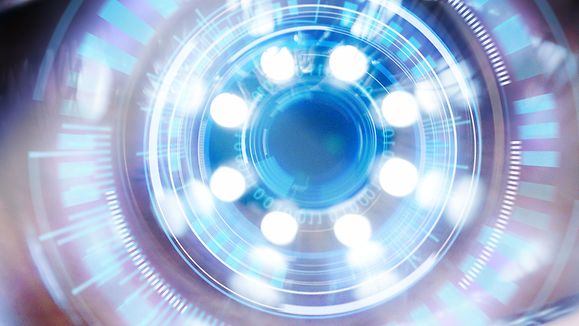Research and Development
R&D News | October 2024
Animal-free chemicals testing, wooden wind rotor blades and a process from removing microplastics from water – these are just some of the more recent developments in Germany’s innovative R&D landscape.
Oct 16, 2024
- Hesse Start-up Develops World’s First Rotor Blades from Wood
- Life Science Start-up Develops Animal-Free Testing for Chemicals
- Leipzig Start-up Solution Removes Microplastics from Water
- Fraunhofer Developing Terahertz and Network Technologies on the Road to 6G
- Saxon roller to make hydrogen drive technology cheaper
- Cargo e-Bike 39 Percent Lighter than Conventional
- MetaVib Project to Reduce Noise Pollution
- New Car Body Concepts for Future Mobility
Hesse Start-up Develops World’s First Rotor Blades from Wood
Hesse start-up Voodin Blade has developed rotor blades made from wood that have been fitted to a wind turbine for the first time. The rotor blades are almost 100 percent recyclable and could potentially make wind energy generation even more sustainable in the future. The rotor blades, expected to be in use for at least 25 years, have a special coating that protects the blades from fungal and insect infestation. The revolutionary blades have been fitted to a 27-year-old wind turbine in Breuna in the district of Kassel. Conventional rotor blades are typically made of glass and carbon fiber and bonded using epoxy resin that offer little or no recycling options once taken out of service. The sheets used to make the blades are milled in Kiel, with their production from laminated spruce veneer plywood claimed to produce almost 90 percent less carbon dioxide emissions.
Life Science Start-up Develops Animal-Free Testing for Chemicals
Life science start-up DNTOX has developed a test system based on human cells that allows chemicals to be tested for neurotoxicity without animal testing. To date, testing has largely been carried out on animals – which is both prohibitive in terms of both cost and time as well as raising serious ethical considerations. According to the Leibniz Institute for Environmental and Medical Research spin-off, clients from the chemicals, pharmaceuticals and cosmetic industries can benefit from a test system that is both cheaper and faster that safeguards ethical testing.
Leipzig Start-up Solution Removes Microplastics from Water
A Leipzig-based start-up has developed a new technology that uses microscopic air bubbles to remove microplastics from water. Some microplastics like microbeads – typically found in cosmetics and toiletry products – have been banned in many countries across the world but the global problem of plastic pollution remains far from resolved. According to the UN Environment Programme, up to 23 million tons of plastic waste leak into the world’s water systems annually. According to MicroBubbles founder Roland Damann, the scalable microbubble solution – that uses fine gas bubbles to remove microplastics by transporting them to the surface without the use of chemicals – could even be implemented in countries and regions without proper sanitary infrastructure.
Fraunhofer Developing Terahertz and Network Technologies on the Road to 6G
The Fraunhofer Institute for Integrated Circuits IIS “6G SENTINEL” project is helping lay the ground for the sixth generation of communications. The project is addressing key 6G technologies for terrahertz frequencies and flexible networks with adaptable infrastructure (specifically flying platforms and satellites) and seeks to develop localization solutions in 6G networks to be merged into an integrated network architecture. The sixth generation of mobile communications, 6G, is set to arrive by 2030 – setting new data rate, reliability, latency, and connection density standards.
Saxon roller to make hydrogen drive technology cheaper
Engineers from Chemnitz and Bad Düben in Saxony have developed a new roll embossing machine to make hydrogen drive technology for trucks, airplanes and ships cheaper. Fraunhofer Forming Institute IWU (Chemnitz) and Profiroll (Bad Düben) are seeking to halve the cost for bipolar plates with the new solution. The “BPP Flexroll” will allow core components for fuel cells and electrolyzers to be produced both faster and cheaper than ever before, thanks to a process similar to newspaper printing. The BPP Flexroll machine is part of a larger Fraunhofer initiative in which the Dresden-based Fraunhofer Beam Institute IWS is also involved. It aims to significantly reduce the production costs of other fuel cell and electrolyzer components in Europe. This includes the continuous coating of electrode plates with particularly efficient materials, laser joining techniques and the like.
Cargo e-Bike 39 Percent Lighter than Conventional
The Fraunhofer Institute for Structural Durability and System Reliability LBF has developed an innovative cargo e-bike that is 39 percent lighter than conventional models. The “LoadLightBike” incorporates a “tubular energy system” that integrates a tubular battery system – containing 80 Li-ion cells with 1,000 Wh capacity – into the redesigned bicycle frame. Innovative sensors allow road condition to be measured and recorded, with a lightweight transportation box with additively manufactured bionic structures rounding off the features on a cargo bike that Fraunhofer believes could transform micromobility.
MetaVib Project to Reduce Noise Pollution
Lightweight materials and structures used in modern machinery and mobility devices often provide extraneous vibrated noise. The “MetaVib” project led by the Fraunhofer Institute for Structural Durability and System Reliability LBF is developing vibro-acoustic metamaterials that effectively reduce noise and vibration. According to Fraunhofer, vibro-acoustic metamaterials will offer new freedoms when designing components with lightweight structures. Potential future uses include noise barriers used to enclose highways.
New Car Body Concepts for Future Mobility
The Future Car Production consortium of Fraunhofer institutes is developing new approaches to assess new car body concepts in the automobile industry. Similar to Tesla’s “giga-casting” concept, the Fraunhofer project reassesses globally accepted vehicle design and production methods. Highly integrated large castings are cast as one piece of aluminum, thereby replacing entire body parts pieced together from individual sheets and components. Optimization in the areas of product quality, repairability and crash safety are foreseen as part of its overarching aim to guarantee ecological sustainability.
